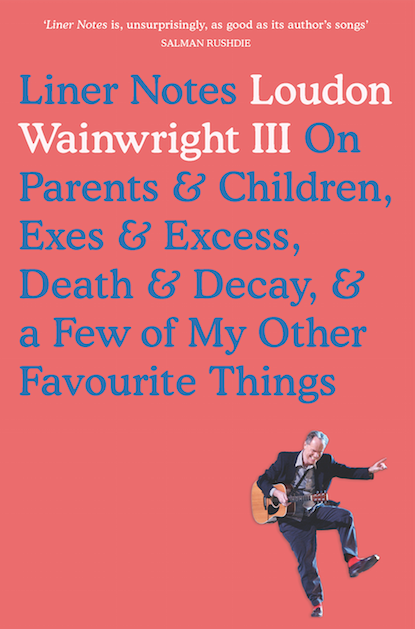Loudon Wainwright: 'Families are entangled... ours certainly is'
Acclaimed folk artist on his new book 'Liner Notes', being jealous of his children, and planning his memorial service

Your support helps us to tell the story
From reproductive rights to climate change to Big Tech, The Independent is on the ground when the story is developing. Whether it's investigating the financials of Elon Musk's pro-Trump PAC or producing our latest documentary, 'The A Word', which shines a light on the American women fighting for reproductive rights, we know how important it is to parse out the facts from the messaging.
At such a critical moment in US history, we need reporters on the ground. Your donation allows us to keep sending journalists to speak to both sides of the story.
The Independent is trusted by Americans across the entire political spectrum. And unlike many other quality news outlets, we choose not to lock Americans out of our reporting and analysis with paywalls. We believe quality journalism should be available to everyone, paid for by those who can afford it.
Your support makes all the difference.Thirty-one pages into Loudon Wainwright’s new book Liner Notes: On Parents & Children, Exes & Excess, Death & Decay, & a Few of My Other Favourite Things, there’s an anecdote about his aunt’s pudendum.
That should give you an idea of how much – or little – the American songwriter holds back in this wonderfully entertaining, insightful and frequently moving reflection of his life, work and family.
Speaking over the phone from New York, he explains that the book is the product of three years’ writing – every morning if he could manage it – to create a memoir that covers everything from alcoholism and affairs to the music he’s picked out for his memorial service. Wainwright had never written a book before, but he knows writers – his late father was a journalist – and his songwriting style is and always has been incredibly personal.
“I can’t say I experience catharsis – whatever that is – but it was interesting,” he says. “The things I write about in the book are the things I write about in the songs, so it wasn’t as if it was new territory for me: writing about my parents, my kids, relationship, the job. It was familiar territory, but instead of rhyming couplets, it was sentences. I had to go in a little bit deeper and explain a few more things, but it didn’t feel all that alien.
“The receiver of the music or the words or the painting, it’s their option to interpret as they wish. I think my songs and the writing of the book are fairly straightforward, they’re not cryptic like Bob Dylan’s songs (which is one of the reasons that they’re great).”
There are several moments in Liner Notes where Wainwright admits to his own ego, writing about how he feels jealous watching his children perform. He’d prefer to have the spotlight for himself. Queuing to see his own children – Rufus, Martha and Lucy – after one of their shows is irritating. He enjoys reading bad reviews about other singers, and good ones about him.
“That’s just an admission of guilt, I suppose, or something like that,” he agrees. “I think our family, because three out of my four kids are performers – it might seem unusual, all these songs and admissions and dwelling on the family issue. But families are entangled – ours certainly is – and there’s been drama, excitement. Thrills and spills,” he adds with a laugh.
His girlfriend Susan Morrison was on hand for some “gentle warnings” about anecdotes or comments that may have been interpreted as too much information. Although he says he left in a rather risqué, but very enjoyable, one about the oedipal complex. He sounds hopeful that he won’t hurt anyone’s feelings.
“I saw Rufus yesterday and he’s reading it – he said he’s enjoying it,” he says. “The jury is out from other family members. I sent it out to everybody but I can’t say for sure. I hope they like it. I always tried to be very aware, I didn’t want to hurt anybody’s feelings or go after anybody.”
Enjoy unlimited access to 100 million ad-free songs and podcasts with Amazon Music
Sign up now for a 4 month free trial (3 months for non-Prime members)
Enjoy unlimited access to 100 million ad-free songs and podcasts with Amazon Music
Sign up now for a 4 month free trial (3 months for non-Prime members)

In between the competitiveness, there are various, wonderful descriptions of the times Wainwright has performed with his children, where he expresses a clear admiration and pride in their talents. In the New York Times, a review suggested an album of the family’s various songs about one another: “You could put the best songs these people have composed about each other on a triple album, and it would be among the great, troubled documents of our time – the back catalogue of their own happiness and heartbreak,” the critic suggested.
“It could work,” Wainwright says, sounding interested. “We do shows together, at the beginning of last year we did that songwriter cruise and performed together as the Wainwright family – the lyrics are printed in the book. So we do actually collaborate. Maybe we should make a triple album. In the show I think the audience loves the differences between us, the similarities and the vocal blend, because there is a bit of a genetic thing going on. People like it when we bring out the family.”
“These days I’ve been thinking a lot about my up-and-coming, unfortunately inevitable memorial service,” he writes towards the end of Liner Notes. “You know – turnout, location, catering, the vibe... that sort of thing.”
Reading it as someone who doesn’t have children is arguably preferable to anyone who does: it’s likely something that eventually lingers on the mind of any parent terrified that their kids won’t attend their funeral. Wainwright sounds surprised at the idea that this passage might be interpreted that way.
“Wow, I hadn’t thought of that. I was trying to be somewhat amusing,” he says. “I think the flip of comedy is, well... the opposite. So I could see how an older fella like myself might feel a bit rueful reading that passage.
“What can I say? I’m 71, I’m in the late innings. So you think about it. It seemed like it might be fun to write it ahead of time, send ahead instructions, so to speak.”
His jealousy of other people’s talent appears quite prominently in this chapter, where he asks for some “lovely unobtrusive music played softly during the service” – Mahler’s Fifth Symphony, perhaps, or the adagio by Samuel Barber used at the end credits of The Elephant Man.
“I’m less threatened when I hear non-lyrical music,” he says. “When I’m in the box, I don’t want to be hearing John Prine songs or Townes Van Zandt music piping down. I’ll take a little Samuel Barber instead.”
Is there anything he’d like to be remembered for?
“Asides from my book, you mean?” he chuckles. “I’m working on a new thing which I did six or seven months ago, a theatre piece which combines some of my father’s writing with my songs.
“It’s kind of a lifetime work, I’ve written a lot about my father and include his writings in the book, which I consider a great bonus for the reader because he was such an elegant, fine writer. I hope to be remembered for that.”
‘Liner Notes On Parents & Children, Exes and Excess, Death & Decay & a Few of My Other Favourite Things’ is out now via Omnibus Press
Join our commenting forum
Join thought-provoking conversations, follow other Independent readers and see their replies
Comments